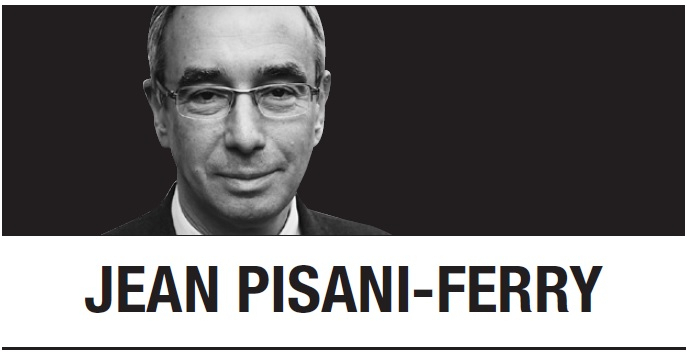
Tectonic changes in the global system are forcing all countries to redefine their strategic outlooks and growth models. But while changes are affecting every country, the European Union faces a far more serious challenge that could put its very existence at risk.
This is not the first time that the EU has found itself at a crossroads. Global crises tend to throw the bloc into an existential spiral that calls into question its priorities, structure and purpose. Whether Europe remains a major global player depends on its response to an unprecedented confluence of emergencies. The most prominent is undoubtedly the war in Ukraine, which has provided a stark reminder that the EU must develop its own security identity to defend its borders.
But other issues are equally pressing. The escalating rivalry between the United States and China is redrawing the map of global power. As the world increasingly divides into competing blocs, Europe must decide whether to align itself entirely with the US or retain a modicum of policy autonomy.
On climate change, the EU positioned itself as a global agenda-setter after the US withdrew from the Paris climate agreement in 2020. But with the US fully recommitted to the climate fight and investing heavily in clean-energy subsidies, Europe must redefine its stance. Will the bloc develop its own version of the Biden administration’s Inflation Reduction Act and embark on a subsidy race with the US and China? Or will it build on its own DNA and respond with trade and competition instruments? European leaders’ recent statements suggest that they are leaning toward the former. Either way, they must decide in a timely fashion.
Europe has reinvented itself twice before, and this inflection point is significant enough to call for a third reinvention. In the mid-1980s, as stagnant growth and high unemployment led economists and political scientists coin the term “eurosclerosis,” then-European Commission President Jacques Delors began drawing up plans for an economically integrated continent. Those plans became the Single Market program and laid the groundwork for the creation of the eurozone.
Globalization proved to be another turning point. In the early 2000s, the United Kingdom’s Chancellor of the Exchequer, Gordon Brown, questioned the wisdom of pursuing European integration when the whole world was already rapidly integrating.
The EU’s response to Brown’s challenge was to reinvent itself as a shaper of global standards. Over the past 20 years, European policymakers have taken a leading role in designing the rules-based international order, exporting regulatory standards for accounting, safety, privacy and consumer protection. As the Wall Street Journal put it, the EU became “the world’s regulator,” using its rulemaking as a form of soft power.
But this type of soft power works only in a world governed by rules. Harvard’s Joseph S. Nye, Jr., who introduced the concept in the late 1980s, explained that the difference between hard and soft power is that the former is fungible -- meaning, transferrable from sphere to sphere -- whereas the latter is not.
That is why the EU must reinvent itself again. In a world where autocrats and their supporters increasingly flout the rules that govern the Western-dominated liberal order, the EU can no longer rely on rules-setting to pursue its strategic goals. It needs a new purpose and identity. To this end, Marco Buti and Marcello Messori have come up with a framework that attempts to reconcile the EU’s domestic and foreign-policy agendas. The EU, they argue, should build on its comparative advantages and focus on delivering European public goods.
This concept makes a lot of sense. It is broad enough to apply to defense, security, energy, and climate action. It is also compatible with the EU’s subsidiarity principle, which holds that decisions should be made by member states whenever sufficient to reach common objectives. It would enable policymakers to switch from centralized tools to local initiatives when needed and could serve as a practical yardstick for deciding what counts as excessive centralization of power.
But even if it adopted this framework, the EU would still have some difficult choices to make. The reason why the EU lacks a common defense policy is not that member states fail to see that they would be better off acting together; it is that they do not trust each other and distrust the EU’s institutions even more. Similarly, European countries recognize that a common energy policy is in their collective interest; the reason they have failed to agree on one is that their national priorities differ widely.
The EU’s recent spree of emergency borrowing to mitigate the impact of the COVID-19 pandemic offers important insights into the current state of European integration. Instead of being directed toward common initiatives, most of the money that was raised through the emergency program was transferred to individual member states.
On balance, the subsidiarity principle would seem to favor endorsing the European public goods approach. But European countries must overcome individual reservations and learn to work together. The road toward a new European model may be mapped out, but it will be long and difficult.
Jean Pisani-Ferry
Jean Pisani-Ferry, a senior fellow at the Brussels-based think tank Bruegel and a senior non-resident fellow at the Peterson Institute for International Economics, holds the Tommaso Padoa-Schioppa chair at the European University Institute. -- Ed.
(Project Syndicate)



![[Herald Interview] 'Trump will use tariffs as first line of defense for American manufacturing'](http://res.heraldm.com/phpwas/restmb_idxmake.php?idx=644&simg=/content/image/2024/11/26/20241126050017_0.jpg)

![[Health and care] Getting cancer young: Why cancer isn’t just an older person’s battle](http://res.heraldm.com/phpwas/restmb_idxmake.php?idx=644&simg=/content/image/2024/11/26/20241126050043_0.jpg)

